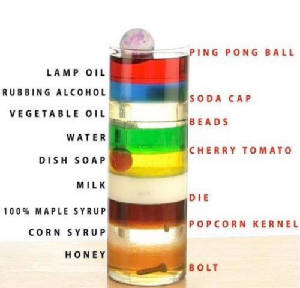Question #a9e46
1 Answer
Water will float with milk.
Explanation:
The first thing I thought of after reading this question density.
Density is the amount of mass per unit volume:
=>
=>
=>
We are not given any specifications so we cannot directly calculate the density. Only way to determine this is by comparing each substance's density, given a density chart or the actual density (like in a test question).
Now we also have to consider in temperature. This is because cooling a substance causes its molecules to slow down, eventually decreasing the volume.
Hot water is less dense and will float on room-temperature water. Cold water is more dense and will sink in room-temperature water.
Also keep in mind the type of milk - processed, skim, homogenized, etc.
The density of water at room temperature is about
Homogenized milk at room temperature is about
Because milk has the higher density than water, we can conclude that water will float in milk.

We see in this image, that this proves to be true. We also see the relationship with other liquids, like dish soap and honey.
Hope this helps :)

